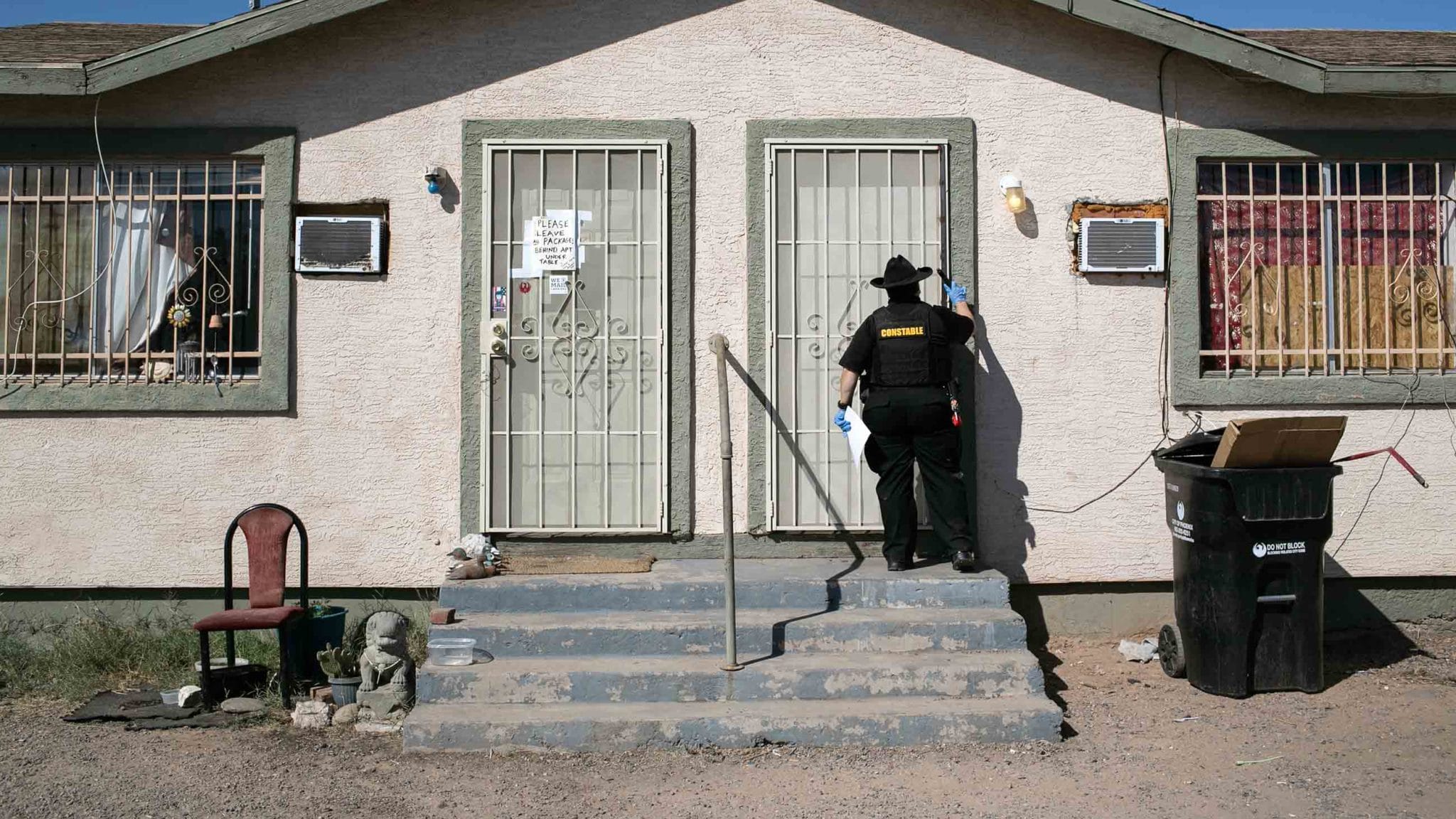Since September, a controversial policy from the Centers for Disease Control and Prevention may have protected millions of cash-strapped tenants from eviction. Now, with the provision set to expire in less than two weeks, experts are warning that an eviction crisis may be imminent. Meanwhile, a legal challenge to the policy, which recently arrived at the Supreme Court, could soon settle lingering questions about whether the CDC even has the authority to freeze evictions.
Covid-19 eviction moratoriums in the United States date back to the beginning of the pandemic, when shutdowns forced millions of people out of work, leaving many unable to pay rent. Congress passed eviction protections for some renters in March 2020, but those protections expired in July. The next month, a group of housing experts issued a stark warning: 30 to 40 million people in the U.S. faced the risk of eviction amid ongoing Covid-19 shutdowns.
In September 2020, the CDC stepped in. Invoking research on Covid-19 transmission, the agency argued that “evictions threaten to increase the spread of Covid-19 as they force people to move, often into close quarters in new shared housing settings with friends or family, or congregate settings such a homeless shelters.” Under a 1944 law that grants the Secretary of Health and Human Services broad powers to stop disease transmission, the agency argued that it could prevent landlords from kicking out tenants.
Advocates say the policy, while not effective at stopping all evictions, did help keep many people in their homes. But the CDC has not decided whether it will extend the moratorium past June 30, and while government funding and city- and state-level policies may help some renters, advocates and progressive policymakers have begun raising alarms about a coming crisis.
“We’re preparing for a possible spike in eviction filings and increased risk of eviction and homelessness for millions of Americans,” Alieza Durana of the Eviction Lab at Princeton University told Slate this week.
Complicating the picture is a legal challenge from landlord groups, who say public health experts at CDC overstepped their legal authority. A group of plaintiffs, led by the Alabama Association of Realtors, sued the federal government in November; a federal district judge sided with the landlords in May, but the case has since been appealed to the Supreme Court. The landlord group’s application to the high court questions why the CDC has maintained the policy even as it loosens pandemic restrictions. “If Americans can safely gather indoors without adhering to the most basic Covid-19 precautions, then there is no longer any public-health rationale for the moratorium,” the filing argues, adding that “the eviction moratorium has become an instrument of economic policy rather than of disease control.”
For many advocates and public health experts, though, the lines between economic policy and public health are not necessarily so clear-cut. In a report for Health Affairs earlier this year, Princeton policy researcher Gracie Himmelstein and Eviction Lab leader Matthew Desmond documented a growing body of research linking eviction with a range of negative health outcomes, including infant mortality, childhood hospitalization, and suicide.
“The U.S. eviction crisis and its associated health consequences preceded the Covid-19 pandemic,” they wrote, “and will remain after the acute effects of the pandemic have subsided.”
Also in the News:
• Until 2018, the National Institutes of Health had never stopped a scientist from receiving funding because of alleged — or confirmed— sexual harassment accusations. But a recent update from the NIH’s Office of Extramural Research (OER) noted that, in the years since, it has fielded more than 200 sexual harassment complaints, with 54 of those cases resulting in the removal of a lead scientist from a grant. The disclosure follows a years-long push for increased accountability from the government’s primary biomedical funding agency, which has been criticized for maintaining weaker harassment policies than those in place at other top funding agencies. Sexual harassment wasn’t the OER’s only focus: In all, the NIH received more than 300 complaints of misconduct since 2018 — including allegations of bullying, discrimination, and other forms of harassment. A total of 75 principal investigators were stripped of funding, and 125 scientists were suspended from serving as peer reviewers for the agency’s grant allocation process. Allegations of racial discrimination in particular have become more frequent: 16 such complaints were lodged during the first four months of 2021, more than the agency received in all of 2020. (Science)
• An analysis of the health insurance records of almost 2 million Americans diagnosed with Covid-19, published this week by the nonprofit FAIR Health, suggests a troubling pattern of lingering symptoms and illness even among patients who had minor symptoms or were asymptomatic. The research, which has not been formally peer reviewed, found that nearly one-quarter of people infected with the coronavirus had at least one new medical issue arise in the subsequent months. The researchers could not determine whether the symptoms were linked to Covid-19, but they did find that the medical problems were worse for those who had been severely ill: Of those hospitalized with Covid-19, 50 percent appeared to experience ongoing health issues. Among people who tested positive but had no symptoms, 19 percent developed a new medical issue after their infection, the data suggested. The most common symptoms included pain, especially in nerves and muscles; breathing difficulties; high cholesterol; fatigue; and high blood pressure. The report urged further study of post-Covid-19 health outcomes, especially for people who had no symptoms while infected but developed related health problems later. (The New York Times)
• As coronavirus restrictions continue to lift across much of the U.S., residents of Rockton, Ill. are being warned to mask up for a different reason. On Monday, a fire broke out at a chemical plant in the village, located just north of the larger city of Rockford near the Wisconsin border. All 70 employees inside the Chemtool factory made it out safely, and residents within a 1-mile radius were ordered to evacuate their homes. The company, owned by billionaire Warren Buffett’s Berkshire Hathaway, manufacturers grease and lubricants for industrial use. While the fire was contained as of Wednesday, emergency management officials have said that sulfuric acid, nitrogen, and lead may have been burning. Public health officials are telling anyone within 3 miles of the plant to continue to wear a mask while outside to protect themselves from airborne particulates. Sandra Martell, public health administrator for Winnebago County, where Rockton is located, also warned people not to pick up any waste falling from the sky. “I know we recently came out of the mitigations for Covid-19, but our masks are going to help protect us as well during all this,” Martell said, according to NBC. The cause of the fire has not been determined. (CNN)
• On Wednesday, the National Weather Service announced that around 46.5 million Americans living in the western U.S. are under a heat advisory or excessive heat warning. In 11 states this week, temperatures reached at least 100 degrees Fahrenheit in one or more residential areas. In Salt Lake City, temperatures hit 107 degrees on Tuesday, tying the all-time record, while temperatures in Las Vegas and Phoenix topped 115 degrees — the highest temperature ever recorded in Vegas on the date of June 16 and the highest temperature in Phoenix so far this year. The hot, dry weather has also raised wildfire risk, with active blazes leading at least four states to issue evacuation orders to some residents. Meanwhile, in Texas, record highs are once again straining the state’s troubled energy grid, and Texas’ Energy Reliability Council has warned of rolling blackouts, suggesting that residents should conserve energy as a precaution. Experts expect that such heat waves will only worsen due to climate change. (USA Today)
• Both scientists and forensics labs have long relied on a collection of 300,000 anonymous genetic samples from men, called the Y-chromosome Haplotype Reference Database (YHRD), both for research and to help solve crimes. The database — the world’s largest collection that focuses on male lineages — has been online since 2000 and essentially provides DNA fingerprints across more than 1,300 global populations. Fans of the database note that it has helped exonerate men who are falsely accused of crimes; the genetic fingerprints can show, for instance, the likelihood that DNA collected from a crime scene aligns with a particular suspect. But as Nature reported this week, some scientists are increasingly questioning the ethics of YHRD because thousands of its samples likely came from men who did not give informed consent. Some of these men, according to Nature, may be from vulnerable “minority ethnic populations such as the Uyghurs in China and the Roma in eastern Europe.” Critics propose that researchers should stop citing the data in journal articles and that journals should launch ethics investigations. And Nature reports that the International Society for Forensic Genetics is also “setting up an oversight board to examine cases in which consent is unclear.” (Nature)
• And finally: Researchers at the University of Edinburgh say they have converted material from plastic bottles into vanillin, a chemical widely used in the food and cosmetic industry, including to produce artificial vanilla flavoring. According to research recently published in the journal Green Chemistry, the scientists were able to synthesize vanillin after converting plastic bottles into their basic constituent unit, terephthalic acid (TA). The researchers then employed genetically engineered bacteria to further convert TA to vanillin. “This is the first example of using a biological system to upcycle plastic waste into a valuable industrial chemical,” said Joanna Sadler, one of the two authors of the study. “It has very exciting implications for the circular economy.” As a next step, according to The Guardian, the researchers “will further tweak” the engineered bacteria in order to make the process more efficient at turning TA into vanillin. The scale of vanillin production is tiny compared to the global plastic output: According to the United National Environmental Program, people purchase 1 million plastic bottles each minute. And in an interview with The Washington Post, one environmental advocate raised concerns about the safety of food products emerging from “these kinds of Rube Goldberg chemistry experiments.” (The Guardian)
“Also in the News” items are compiled and written by Undark staff. Deborah Blum, Brooke Borel, Lucas Haugen, Sudhi Oberoi, Jane Roberts, and Ashley Smart contributed to this roundup.










